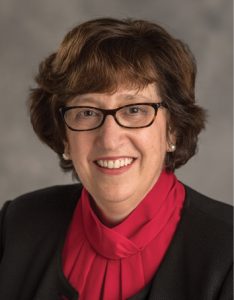
Martha Pollack
By the time this issue reaches you, my husband, Ken Gottschlich, and I will be settling in to our new lives at Cornell. We are eager to connect with the University’s worldwide community, and I hope these regular columns will spark your ideas and continuing involvement.
When I was interviewing for this job, a faculty member described Cornell to me as “an Ivy League school with a Big Ten heart.” I have been at both types of institutions, and I knew his description was apt. The University has a rare confluence of qualities that make leading it tremendously exciting.
Cornell combines excellence in the liberal arts, sciences, and professional disciplines with an abiding commitment to the public good. The University has an enduring focus on the creation and curation of knowledge—of learning for its own sake. That pure scholarship is complemented by the application of knowledge to make a real and lasting difference in the world, in ways that are only possible because of Cornell’s remarkable intellectual breadth and global engagement. One of my key responsibilities will be to ensure that the University continues to recruit and retain the very best faculty, students, and staff and provide the environment in which they can do work of the highest quality. Outstanding teaching and discovery are traditions that I’ll work to keep strong.
Cornell has had an egalitarian spirit since its founding: every Cornellian knows Ezra’s vision of a university where “any person can find instruction in any study.” Our students will graduate into a highly diverse world, and preparing them to work across cultural differences is one of the most important things a university can do. Beyond that, there is a large body of evidence showing that better solutions to challenging problems are achieved when multiple perspectives are brought to bear. On my watch, we will continue to honor and support the rights of people of all backgrounds and perspectives to be part of Cornell.
I value the University’s strong tradition of championing free speech while upholding community norms of respect. Freedom of expression is fundamental and inviolable. We cannot possibly advance knowledge if we don’t entertain challenging ideas, and we must allow the expression even of views we find highly offensive. At the same time, we must develop a culture of respect, so that productive discourse can occur. Achieving those two goals simultaneously is not always easy, but doing so is essential both to the academy and to our democracy.
Another attribute that drew me to the University is its openness to innovation, evidenced most recently by Cornell Tech and the increasing possibilities we now have to stimulate radical collaborations across all of our campuses. Institutions that are willing to try new things are the ones that will survive, and Cornell will not just survive but thrive.
Universities deal with serious matters—complex research, student well-being, budget concerns—but, in general, better results are achieved when work, even serious work, is done in a setting of laughter and joy. And the Cornellians I’ve met so far clearly enjoy having fun. In that spirit, I intend to honor one long-standing tradition right away by sampling the many ice cream flavors at the Dairy Bar. Of course, I may then have to honor another tradition—climbing all 161 steps to the top of McGraw Tower—to work off the effects.
I invite you to join us in Ithaca (or to watch the livestream) on August 25 for my inauguration as Cornell’s fourteenth president. It will be an occasion to reflect on the role of higher education. We’ll also laugh a lot and have fun. And, yes, for those on campus, there will be a new ice cream flavor to mark the occasion, and I promise we won’t make you climb 161 steps afterward!


